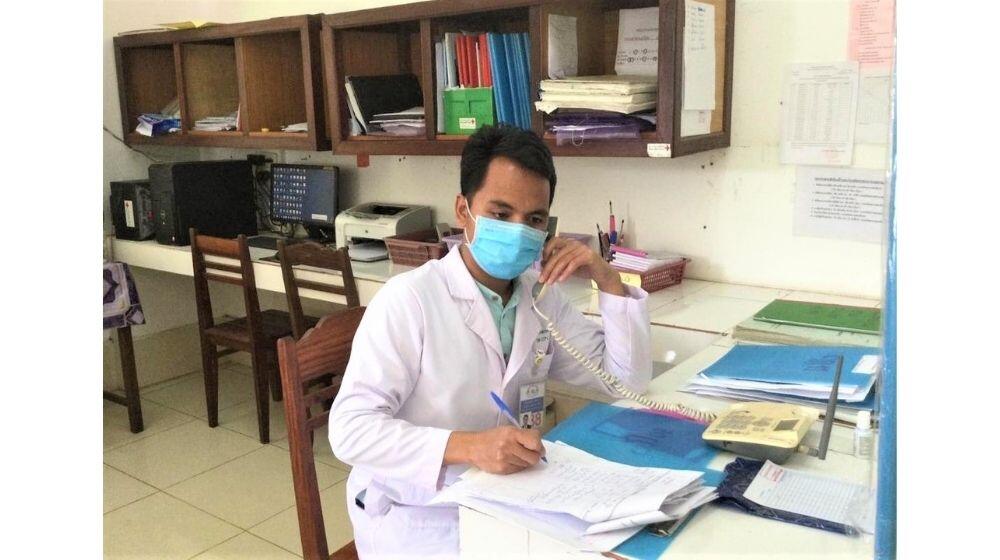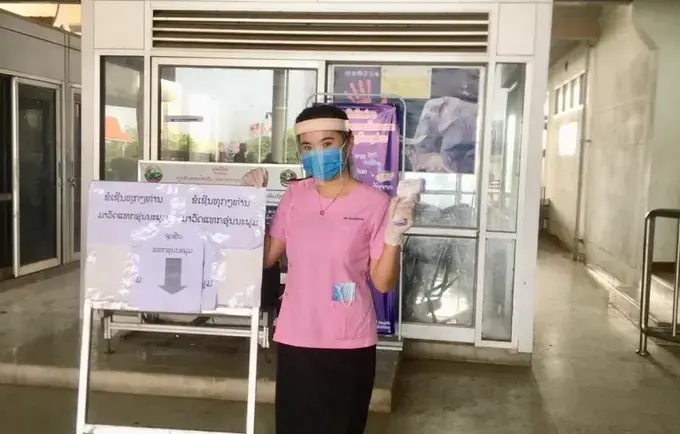“Telehealth makes it convenient to connect with patients and provide counseling to them. We can also ensure that they are referred to the hospital on time in case of emergency. In addition, telehealth is a good way to continue providing health services during COVID-19 to reduce the risk of exposure and transmission, ” said Mr. Choun-ou-meaun.
Mr. Choun-ou-meaun, 32, an obstetrician-gynecologist at Sekong Provincial Hospital, attended a virtual training on telehealth organized by the Department of Health Personnel, Ministry of Health (MoH), with support from the United Nations Population Fund (UNFPA).
An additional 152 health providers from Sekong, Sayabouly, Phongsaly, and Vientiane Province participated in the training during December 2021. The health providers were working in quarantine centers and isolation facilities since the COVID-19 hit. The training focused on using telehealth as a modality to provide essential Reproductive, maternal, newborn, child, and adolescent health (RMNCAH) services, including COVID-19 prevention and protection information in those facilities.
The interactive sessions included the referral system, family planning services, documentation, antenatal care, delivery, postnatal care, mental health, and counseling skills, including role-plays.
Previously, MoH and UNFPA already trained health providers from six central and southern provinces when the influx of female migrants returning home was high. This capacity building and telehealth equipment have contributed to ensuring responsiveness and continuity of RMNCAH services while keeping both health providers and patients safe during the pandemic.
Piloted in 2020, use of digital provision of essential RMNCAH services has seen a positive result as over 80% of the Lao population owned a mobile phone (Census, 2015); this innovation brings patients and health providers closer than before. It provides quick and immediate assistance to women, especially in times of crisis.
Providing essential RMNCAH services in rural and remote areas is a great challenge in Laos. Many women in hard-to-reach areas either do not have access to health care facilities or have difficulties reaching due to long-distance and lack of transportation, among others. Lockdown and disruption of RMNCAH services due to COVID-19 have exacerbated the situation.
COVID19 has set back a number of indicators such as the use of contraceptives which declined 15% in 2021, leading to higher number of unwanted pregnancies, increase in women seeking post abortion care due to complications of unsafe abortions and increase in still births due to reduced access to antenal care. Telehealth connects women with the health providers and vice versa whenever needed and wherever they are.
While telehealth represents a significant milestone in the health sector response to COVID-19, improvement is needed to scale up to cover all women of reproductive age, especially vulnerable and marginalized groups. “We have to consider those who do not own a mobile phone or a smartphone, and ethnic people who do not speak Lao like in Sekong there are many ethnic minorities,” said Mr. Choun-ou-meaun, who suggested making available diverse communication tools and channels to break language barriers.
In recognition of improvement, telehealth sheds light on the future of community-based RMNCAH services in all situations with or without crisis. Further investments are required to support MOH to expand the telehealth modality to other provinces, so that women and girls can access essential health services, not only during the COVID19 pandemic, but also during seasonal floodings and for areas where access is difficult. UNFPA will continue to support MOH to ensure universal access to quality and inclusive sexual and reproductive health and rights for all.
***************
UNFPA is the United Nations sexual and reproductive health agency, works in over 150 countries including Lao PDR, to achieve zero maternal deaths, zero unmet need for family planning, and zero gender-based violence.
For more information please contact:
Ms. Siriphone Sakulku, SRH Programme Coordinator
UNFPA Lao PDR
Email: ssakulku@unfpa.org
Ms. Vanly Lorkuangming
Communications and Partnerships Analyst,
UNFPA Lao PDR
Email: lorkuangming@unfpa.org





